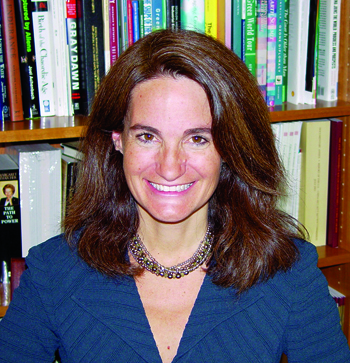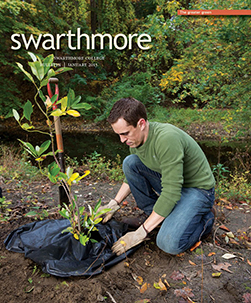Cleaning and Greening China
As China moves from poverty to power, Elizabeth Economy ’84 pushes for environmental responsibility

A generous grant from Elizabeth Economy will enable the new team-taught Asian studies/environmental studies course Governance and Environmental Issues in China to culminate in a two- or three-week trip to Beijing this spring that will pair five China Agricultural University students with five Swarthmore students for collaborative research experiences. Photo courtesy of CFR
Elizabeth Economy ’84’s interest in China and the environment was first sparked at the University of Michigan, when she was working on her doctoral dissertation on Chinese and Soviet strategies toward global climate change. After finishing a year of fieldwork in China and the Soviet Union, she says, “I became interested not only in the countries’ approaches to climate change but also in their domestic environmental situations.”
Since 1994, Economy has worked at the Council on Foreign Relations (CFR), where she is a C.V. Starr senior fellow, director for Asia studies, and member of a think tank comprising more than 70 full-time, adjunct, and visiting scholars and fellows whose expertise on all the world’s regions contributes to the shaping of today’s global agenda.
Economy frequently testifies before Congress and is a sought-after speaker and debater on radio and TV shows on U.S.-China relations. She has published prolifically in newspapers and journals and is the author of the award-winning book The River Runs Black: The Environmental Challenge to China’s Future, which was selected by the Globalist as one of the Top 10 Books of 2004, and by Cambridge University as one of the top 50 books on sustainability. Strategy+Business magazine named the second edition one of the best business books of 2010.
Soon after joining the CFR, Economy began to focus on China’s environment as her primary area of research. “At the time, not many people thought there was much policy relevance to the issue, but as it turns out, Vice President [Al] Gore took a personal interest in China’s environment, and I had the opportunity to brief him—as well as the National Security Council—before he traveled to China.”
Economy also helped organize a roundtable with Chinese environmental activists for President Clinton, and when Clinton and Chinese President Jiang Zemin established the China-U.S. Center for Sustainable Development, Economy was appointed to its board.
She is most proud of the center’s recent success in raising the money to construct an earthquake-proof school using top-of-the-line green practices in Sichuan Province, a response to the 2008 earthquake that ravaged the region; she hopes the school will serve as a model for others in the country. Economy has continued to brief and work to expand environmental cooperation with interested officials such as Bush Administration Treasury Secretary Henry Paulson and Secretary of State Hillary Clinton.
She is particularly optimistic at the change in attitude of the Chinese people toward the environment. “One of the most exciting changes in recent years has been the rise of environmental activism in China. The future of China is with the Chinese people, and they have an incredible group of activists who are fearlessly pushing for change from the bottom up.”
 Email This Page
Email This Page